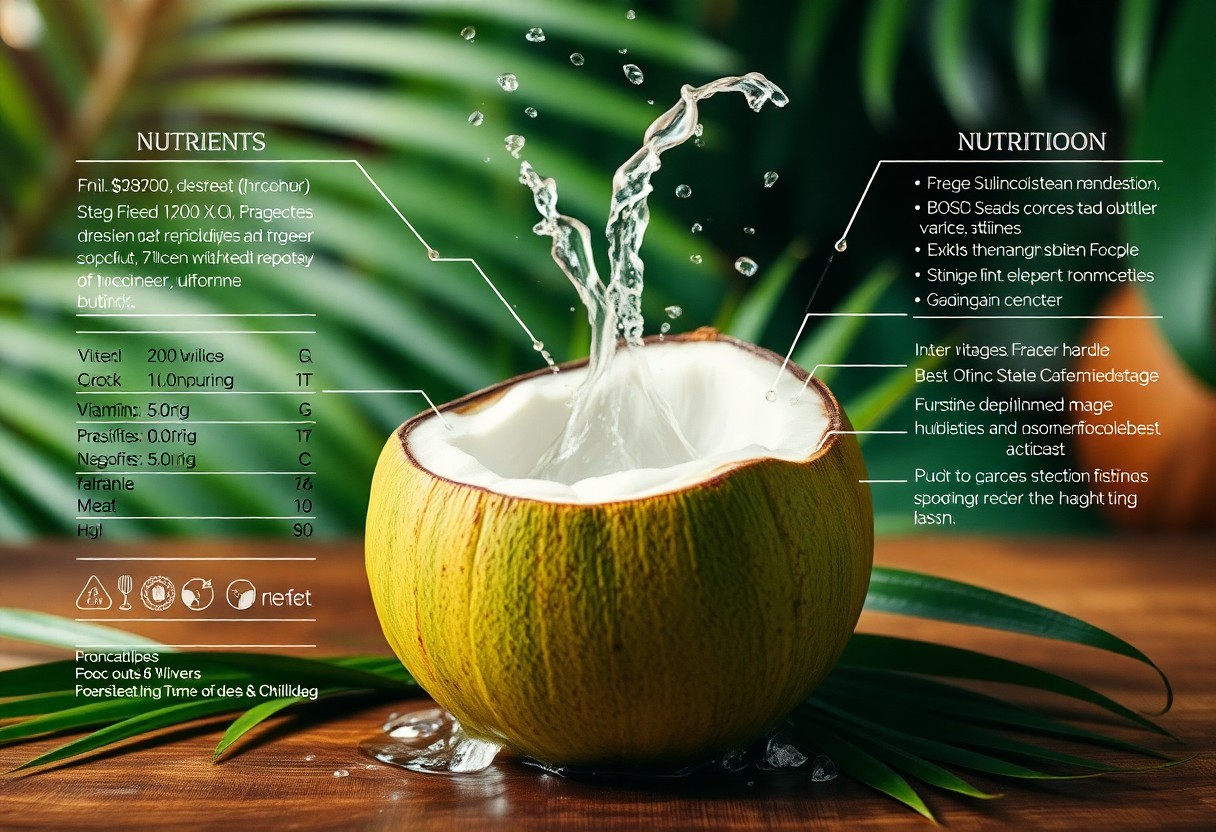There's a refreshing beverage that has gained popularity for its numerous health benefits—coconut water. Packed with important nutrients, this natural drink offers hydration that exceeds that of water, making it an excellent choice for your daily fluid intake. In this blog post, you'll discover the nutritional profile of coconut water and explore how it can keep you energized and replenished, especially during those hot summer days or after an intense workout. Let's look into the hydrating benefits that coconut water can bring to your lifestyle.

The Nutritional Profile of Coconut Water
Coconut water offers a unique array of nutrients that make it a refreshing and healthy choice for hydration. Low in calories at just around 45 calories per cup, it is rich in hydration and packed with vital nutrients. This natural beverage is an excellent alternative to sugary sports drinks, providing a balance of vitamins and minerals that support overall well-being and replenishment.
Key Vitamins and Minerals
Your body benefits from the variety of key vitamins and minerals found in coconut water. It contains meaningful amounts of vitamin C, which boosts your immune system, as well as B vitamins like riboflavin, niacin, and pyridoxine, vital for energy production. The presence of minerals such as potassium, magnesium, and calcium enhances bone health and muscle function, making coconut water a fantastic addition to your diet.
Electrolyte Composition
The electrolyte composition of coconut water is one of its standout features, making it an effective rehydration solution. Rich in potassium, it contains about 600 mg per cup, which significantly aids in balancing fluid levels in your body. Additionally, the presence of sodium, magnesium, and calcium helps to replenish the electrolytes lost during physical activity, ensuring optimal hydration and performance.
Moreover, coconut water’s electrolyte profile closely resembles that of human blood plasma, allowing for quick absorption and replenishment. This makes it especially beneficial after intense workouts or on hot days when dehydration is a concern. The natural sodium content, although lower than traditional sports drinks, can still support hydration, while the substantial potassium helps maintain muscle function and nerve communication. This makes coconut water not just a thirst quencher, but a powerful ally in maintaining your body’s fluid balance.
Hydration or Hype? Debunking Myths
Your perception of coconut water often hinges on popular belief, but many myths cloud its true benefits. It's easy to fall for buzzwords and marketing, but research reveals that coconut water provides effective hydration comparable to traditional options like sports drinks and regular water. Don’t be swayed by social media claims; the science stands strong, proving that coconut water can be an integral part of your hydration regimen.
Coconut Water vs. Traditional Hydration Methods
Coconut water competes favorably with traditional hydration methods, offering natural electrolytes like potassium and sodium, which facilitate better hydration than plain water alone. While sports drinks may contain added sugars and artificial ingredients, coconut water delivers hydration without those downsides. It’s a wholesome alternative, especially for those who prefer natural sources of energy.
Misconceptions About Sugar Content
Many believe that the natural sugars in coconut water negate its health benefits, but this isn’t the case. A typical serving contains about 6 grams of sugar, which is considerably lower than most sports drinks. The sugar in coconut water is naturally occurring and comes with electrolytes and other nutrients that your body craves, making it a smart choice for hydration without the sugar crash.
Overlooking the sugar content in coconut water can lead to misconceptions about its overall health benefits. Unlike processed beverages loaded with high fructose corn syrup, the sugars in coconut water come from actual coconuts and are accompanied by vital nutrients. For instance, while a 16-ounce bottle of a popular sports drink may contain around 14-20 grams of sugar, coconut water still remains a low-calorie option. The natural sugars help replenish your energy levels without causing spikes in blood glucose, promoting a more stable energy release during physical activities.
The Role of Coconut Water in Exercise Recovery
Coconut water serves as a fantastic tool for exercise recovery, providing not only hydration but also imperative nutrients that can support your body’s repair processes. Consuming coconut water after a workout can help you bounce back quickly, ensuring your muscles are nourished and your hydration levels are restored. Athletes and fitness enthusiasts alike have started incorporating this natural beverage into their recovery routines for an efficient and refreshing way to recover post-exercise.
Replenishing Electrolytes Post-Workout
After an intense workout, you lose significant amounts of electrolytes through sweat, which can lead to muscle cramps and fatigue if not replenished. Coconut water is rich in potassium, sodium, and magnesium, making it an excellent option to restore these vital electrolytes. A single serving of coconut water typically contains about 600 mg of potassium, surpassing many sports drinks, allowing you to recover effectively while also rehydrating your body.
Impact on Performance and Endurance
Coconut water’s hydrating properties play an imperative role in your performance and endurance during workouts. The beverage’s mix of natural sugars, electrolytes, and antioxidants can fuel your exercise sessions, improving stamina and reducing fatigue. Studies show that athletes who consume coconut water alongside their training often report enhanced performance levels, attributing it to its ability to maintain hydration without causing gastrointestinal distress, a common issue with many commercial sports drinks.
The benefits of coconut water on performance and endurance extend beyond hydration. It not only delivers necessary electrolytes but also provides quick-digesting carbohydrates, which can help sustain energy levels throughout your workout. With a reputation among athletes for its refreshing taste and effectiveness, coconut water has emerged as a go-to alternative for those looking to enhance their athletic capabilities without the additives found in traditional sports drinks.

Health Benefits Beyond Hydration
Coconut water offers a myriad of health benefits beyond just hydration. Packed with imperative nutrients, it serves as a natural sports drink, providing electrolytes that help replenish what your body loses during exercise. The natural sugars found in coconut water give you a quick energy boost without the crash associated with sugary energy drinks. You may also find that it aids in weight management and provides a refreshing alternative to high-calorie beverages.
Antioxidant Properties and Skincare Benefits
The antioxidants present in coconut water are a boon for your skin and overall health. These compounds combat oxidative stress in your body, protecting your cells from damage caused by free radicals. Regular consumption may enhance your skin's appearance, giving it a youthful glow and reducing signs of aging. When applied topically, it can soothe irritation and provide hydration, making it an excellent addition to your skincare routine.
Supporting Digestive Health
Coconut water is known for its ability to promote digestive health due to its natural electrolyte content and high fiber levels. You may find relief from digestive issues such as bloating or constipation thanks to its hydrating properties, which help in the movement of food through your digestive tract. The presence of certain enzymes in coconut water also supports nutrient absorption, allowing your body to make the most out of the food you consume.
Incorporating coconut water into your daily routine can significantly enhance your digestive wellbeing. The fiber in coconut water aids in maintaining a healthy gut, promoting regular bowel movements and preventing discomfort. Additionally, the electrolytes help restore balance in your system, especially after exercise or a heavy meal. A glass of coconut water on an empty stomach can stimulate digestion and kickstart your metabolism, making it an effective natural remedy for those looking to improve their gut health.
How to Incorporate Coconut Water into Your Diet
Integrating coconut water into your diet is both simple and delicious. Enjoy it straight from the carton or can, or use it as a refreshing base for smoothies. Swap out sugary drinks for coconut water during meals or after workouts for a low-calorie, hydrating option. You can also incorporate it into homemade dressings, or use it to boil grains like quinoa or rice for added flavor and nutrients. The versatility of coconut water makes it easy to enhance your daily hydration routine.
Creative Recipe Ideas
Transform your meals with creative recipes featuring coconut water. Whip up a tropical smoothie by blending coconut water with frozen pineapple, spinach, and banana. Make a zesty salsa by mixing diced mango and onion with coconut water for a delightful topping for grilled fish or chicken. Consider using coconut water instead of water in your morning oatmeal or overnight oats for a subtle sweetness and additional electrolytes. With endless possibilities, coconut water can elevate your culinary creations.
Choosing the Right Coconut Water Products
Not all coconut water products are created equal; selecting the right one can enhance health benefits. Look for brands that offer 100% pure coconut water without added sugars or preservatives. Opt for organic varieties to avoid pesticides, and pay attention to the packaging as BPA-free cartons or bottles are preferable. Consider sourcing coconut water that's been preserved using high-pressure processing (HPP) to retain nutrients while maintaining freshness. A reputable brand will also provide information about sourcing and the time taken from tree to packaging, ensuring you're enjoying the best quality product.
Conclusion
From above, it is clear that coconut water offers an array of nutritional benefits and exceptional hydrating properties for your body. Packed with electrolytes, vitamins, and minerals, it serves as an excellent natural alternative to traditional sports drinks. Incorporating coconut water into your daily routine can help replenish lost fluids, enhance your hydration levels, and support your overall well-being. By choosing coconut water, you're providing your body with a refreshing and nutritious way to stay hydrated and energized.
FAQ
Q: What are the nutritional components of coconut water?
A: Coconut water is low in calories and contains a variety of vital nutrients. It is primarily composed of water (about 95%) and provides a good source of electrolytes, including potassium, sodium, and magnesium. Additionally, it contains small amounts of carbohydrates, sugars, and vitamins such as vitamin C and several B vitamins. This unique combination of nutrients makes coconut water a refreshing and hydrating beverage.
Q: How does coconut water help in hydration?
A: Coconut water is an excellent hydrating drink due to its high electrolyte content, which helps to restore lost fluids and maintain proper fluid balance in the body. The presence of potassium can aid muscle function and prevent cramps, making it a popular choice for athletes and individuals engaged in physical activities. Drinking coconut water can efficiently replenish hydration levels after exercise or during hot weather conditions.
Q: Can coconut water aid in recovery after exercise?
A: Yes, coconut water can support recovery after physical exercise. Its electrolyte content is comparable to that of sports drinks, but it is lower in sugar and calories, making it a healthier alternative. The potassium in coconut water helps in muscle function and can prevent muscle fatigue. Consuming coconut water post-workout can help restore electrolyte balance, thus promoting better hydration and recovery.
Q: Are there any health benefits associated with drinking coconut water?
A: Drinking coconut water has several health benefits. It may aid digestion due to its natural enzymes, support heart health by helping to maintain blood pressure levels, and contribute to overall hydration. Additionally, the antioxidants present in coconut water can help neutralize free radicals in the body, contributing to improved overall health. However, moderation is vital, as excessive consumption might lead to an imbalance in potassium levels.
Q: Is coconut water safe for everyone to consume?
A: Generally, coconut water is safe for most people to consume. It is a natural drink with numerous health benefits; however, individuals with specific health conditions, such as kidney disease or those on potassium-restricted diets, should consult a healthcare professional before adding it to their diet. As with any food or beverage, moderation is key, and it is always best to consider individual dietary requirements and personal health conditions.

0 Comments